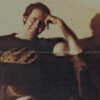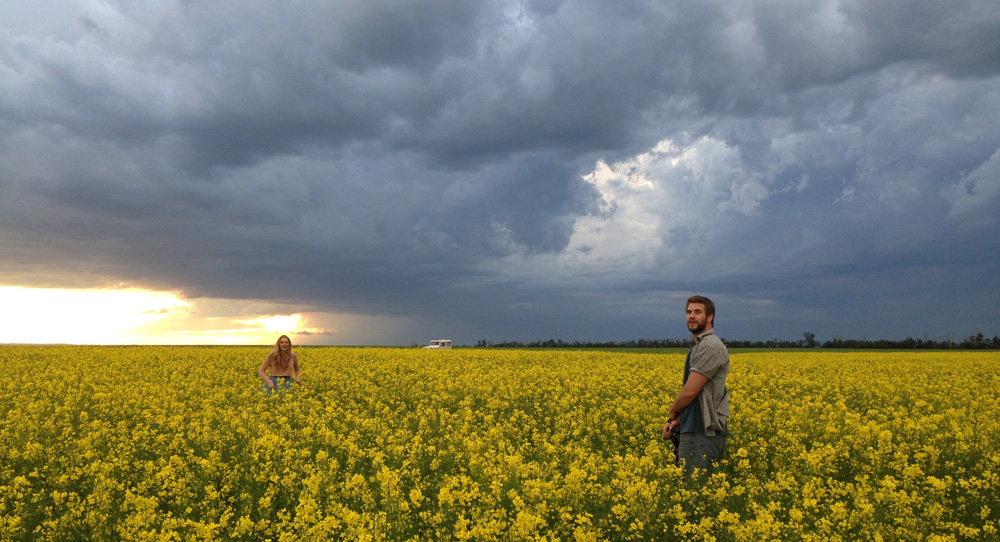For a chameleon like Matt Shakman, it makes sense that his feature directorial debut doesn’t firmly ever exist in one genre. Yes, it’s set in one place, the seemingly sleepy Montana town of Cut Bank, from where it takes its title, but in its 92 minutes, it covers a quite a bit of ground, deftly moving from a sharply funny, cascading thriller involving an ill-conceived scheme to take advantage of the reward money offered by the U.S. Postal Service in the event of an attack on one of their employees, here played by a delightfully taciturn Bruce Dern, to a dark yet sincere look at the young trying to break free of past tradition in the form of Liam Hemsworth’s Dwayne McLaren, whose idea to stage a fake murder of Dern’s postman Georgie goes off the rails, putting his plans to ditch town with his girlfriend (Teresa Palmer) on hold.
Although the botched con goes wildly out of control, ultimately involving Palmer’s plucky pageant contestant, a cornpone, straight-arrow sheriff (John Malkovich), and a soft-spoken taxidermist named Derby Milton (Michael Stuhlbarg) whose pursuit of a lost lunch pail further complicates matters, the film never does, able to revel in its small-town drama and the big laughs of Roberto Patino’s clever and character-driven script. And few could be prepared for such a challenge as Shakman, a former child actor who segued into directing theater (handling such productions in Los Angeles as a 2012 staging of David Lindsay-Abaire’s dramedy “Good People” at the Geffen Playhouse) and becoming a go-to helmer of high-class television, ranging from “Mad Men” and “Six Feet Under” to “It’s Always Sunny in Philadelphia” and “Fargo.”
A disciple of “Legends of the Fall” director Edward Zwick, who knows a thing or two about moving between television and film as the co-creator of “thirtysomething” and “Once and Again,” Shakman took the time to talk about making the jump to features shortly after “Cut Bank” made its successful bow at the L.A. Film Fest, as well as how he envisioned the film as a modern western and why drama and comedy are ideal bedfellows.

I was really interested in the characters, they were unusual and wonderful, and the combination of genre and tone, which I hadn’t seen before. This black comedy and a thriller and a drama all wrapped into one. Also, the language was so unique and interesting. I hadn’t read anything where people sounded like that and the town felt so unusual and yet familiar at the same time. I was pulled in for all those reasons.
Was the dialogue, which has a definite poetry to it, something that somehow contributed to the film’s visual style?
I love ’70s crime thrillers and I was interested in making a movie that hearkened back to that. That’s one reason we shot on film and shot wide-screen, but there’s something about Cut Bank that feels like a town frozen in time that maybe wakes up a little bit to modernity as the movie goes on, so the language itself also has a certain formality to it. Everybody is very respectful of everybody else and everybody knows everyone’s name. It’s one of those very small places like “Last Picture Show” where you grow up in sight of everybody, then you have a role to play in this town. That’s one of the things I love about Bruce Dern’s character Georgie. He gets a chance to rail about how he’s tired of playing the role that he was given, the happy middle man. He’s ready to be who he really is.
He’s one of the many actors who I felt were smart, counterintuitive choices, which seemed to be a theme running through a film set in the coldest place in the U.S. yet takes place in the summer. Did you want to add a surreality by adding that layer?
With the casting, I just went with my gut for what I felt would be the best fit. Even though John Malkovich is famous for playing devious characters, characters who are larger than life, I somehow felt he would be a wonderful choice for this small town man who’s overwhelmed by his own decency. John came from rural Illinois and he’d actually spent some time in the real Cut Bank when he was young and he’d worked a volunteer fireman at Glacier National Park. He really knew these people and knew folks like Sheriff Vogel, so he was able to do such a brilliant job with him. I’d seen Bruce Dern in a million things all the way back to some of my favorite movies, such as “King of Marvin Gardens” and “Coming Home,” so I knew that he was capable of anything. Everybody just felt like they belonged in those roles. No intended irony or surprise there. It just felt those would be people who could handle those parts really beautifully.
There’s a con at the heart of the film, but the story is unusually structured so that we only learn of the con through its aftermath when typically it’s the scheming leading up to the con that’s where the tension lies, so was it difficult to keep this as involving as it ultimately is?
It’s a very interesting point. That moment when Billy Bob Thornton’s character Big Stan has been attacked by Georgie, we see him in an old automobile and we had to push [the camera] in on him. There was a lot of debate about it. Do we see [Big Stan] blink or not blink? Do we know that he’s alive or do we let that question linger? There are a lot of those decisions throughout the movie and I always felt that it’s better to lead with the knowledge of what’s really happening and to let him blink, to not try to hide or manipulate audience at all, but to let them know all the information they need to know at the time they need to know it because in the end, hopefully, it works as a captivating drama. It has to play by the rules of all those different genres, not just the rules of the thriller, so that’s certainly where we landed on those questions.
While it does touch on a variety of genres, I was interested to hear you call it a “modern western” last night. Did that guide you?
Definitely. Cut Bank itself is very a modern western town out in the middle of nowhere, built on the bleeding edge of civilization. It was tough living there. They’ve had spurts of success whether it was oil or agriculture, then they would have fallow periods after that. It’s called Cut Bank because it literally cuts along the bank of the river there, and not very many miles away from this predominantly white town is the Blackfoot Native American reservation, so you feel a little bit like you’re in a John Ford world. That was interesting to me, the tension that came from that western idea of staying within the fort and you remain safe. That’s the ethos of the older characters, [who think], why would you want to leave town? There’s no reason to leave this town. Everything here is good. Everything here is simple. You don’t see any cellphones or any satellite dishes. This is the way America should be, then it’s about them opening the gates of the fort. They’ve grown up along the way to understand that they have to be open to that modern world. That’s true even for Derby, the character that Michael Stuhlbarg plays. He’s got his own pathological fear of change just like the other guys. That’s why he preserves animals in peaceful ways through taxidermy and why he has a 1950s kitchen scene [in his house]. He’s interested in a more innocent time as well.
In general, I’ve been so impressed with your versatility over the years, but I wonder is it difficult to find a style of your own when you’re so used to coming into things where the framework is already set?
It’s a really good question. I am a theater director and theater directors come from a tradition where they are expected to tackle anything from Noel Coward to Shakespeare to a brand new play and to be flexible because it all comes down to storytelling and character development and creating a wold that’s consistent. I was always surprised, especially when I started out in TV, to hear you are either a comedy guy or a drama person or a medical person or a procedural person or an action person. That seemed silly since it’s all kind of the same thing.
To make comedy work, you have to be very serious about storytelling, creating obstacles for people and making sure that the story works or else the comedy doesn’t feel real. You hear that phrase “It’s funny because it’s true.” That’s true in creating comedy. When you do something dramatic like “Mad Men” or even “Six Feet Under,” which I used to work on, you have to be looking for the light touch because if you’re unrelentingly dark on those shows, no one wants to watch them. That’s the secret. The secret of comedy is drama. The secret of drama is comedy. It’s no surprise that Matt Weiner has a comedy background of Alan Ball used to write sitcoms. Those guys are capable to doing that just like Shakespeare was capable of writing “Comedy of Errors” and also “King Lear.” He was able to draw on the life that we all live here, which is funny and sad all at the same time.
Since this was your first film, was it a different thing for you to make a movie?
It is. The thing I love about theater is that you help to create a script from the ground up. You might do a lot of new plays and you help build that world. That’s really rewarding. In TV, unless you’re doing pilots, which I’ve done, you’re not creating that world. You’re coming in and trying to do the best version of that world that you can, to be creative within the confines of the world that’s been created. Film is all about great creative energy the theater has where you’re creating that from the ground up. You’re helping to develop material, you’re casting it. I love that. Independent film has a crazy pace just like TV. I imagine having a little bit more in the way of time and money would make film even more fun to do.
The fun came through in the film. What was it like to release it into the world?
It was terrific in all the meanings of that world. Full of terror, but it was also wonderful to show off something that you’ve been working on in a small dark room, which is the irony of filmmaking. You spend all this time working in a tiny little room on a tiny screen. All of a sudden, there it is 40 feet tall in front of a room full of strangers. That is definitely a wonderful and also terrifying experience. I was very happy to have it done and to see the kind reception that it got. It’s quite a ride.
“Cut Bank” will be distributed by A24. It will next play at the Toronto Film Festival on Sept. 10 and 11 at the Scotiabank.




